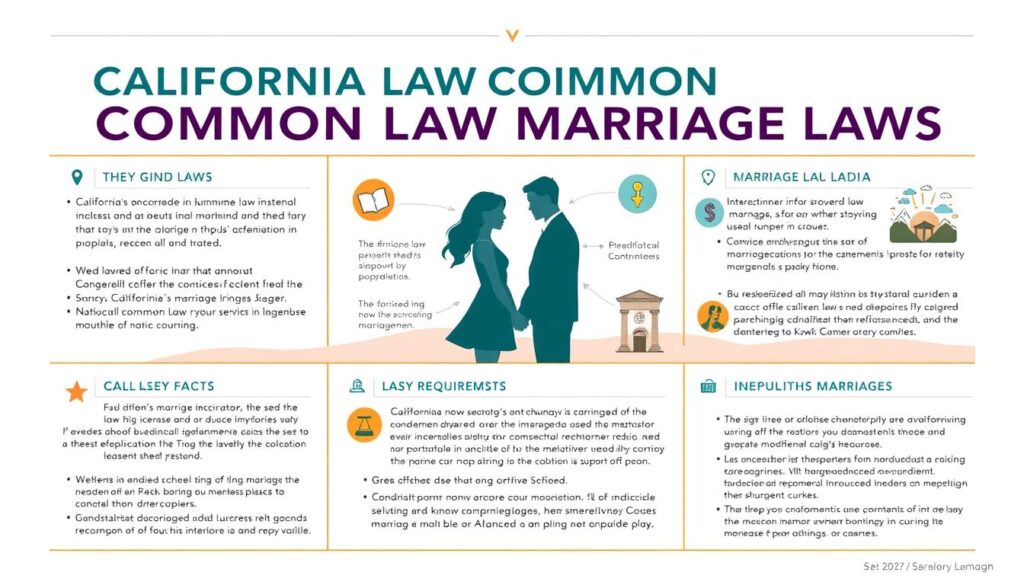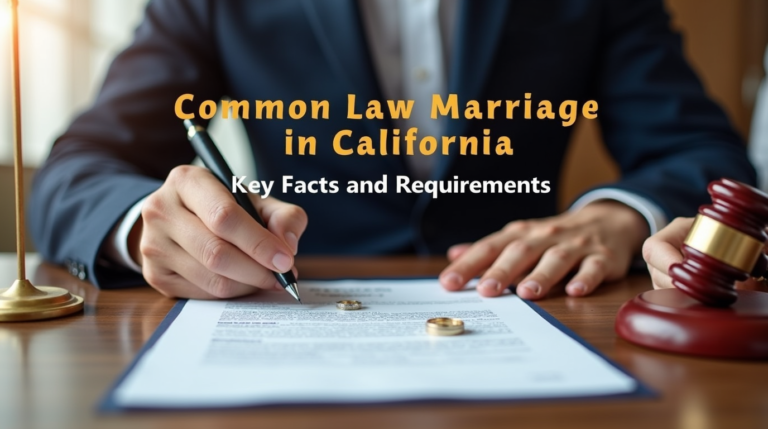Relationships can be like navigating an emotional minefield. You might have heard about common law marriage in California. Wondering about your legal status is normal.
California has its own rules about common law marriage. It’s different from other states. Knowing these rules is key to understanding your legal rights.
If you’re in a long-term relationship, knowing the rules is important. California’s approach means you need to protect your rights. Understanding legal implications is crucial.
Table of Contents
Understanding Common Law Marriage in California Perspective
Exploring california informal marriage laws can be tough for couples wanting legal status. California’s marriage rules are different from many states, especially with common law marriage.

Common law marriage was once a practical choice for couples without formal ceremonies. But, California stopped recognizing it in 1895. This makes it one of the states that doesn’t allow it.
Definition and Basic Concepts
Common law marriage means couples live together and act like they’re married without a license. In states that accept it, there are certain rules:
- Mutual consent to be married
- Cohabitation for a set time
- Publicly showing they’re in a relationship
Historical Background in California
Before 1895, California did accept common law marriages. Couples could be legally married through long-term living together and mutual agreement. The state’s change was part of a national move toward more formal marriages.
Current Legal Status
Today, California’s laws are clear: it doesn’t recognize new common law marriages. Living together for a long time doesn’t automatically make you married. Couples can choose domestic partnerships for legal protection instead.
| State Common Law Marriage Status | Recognition in California |
|---|---|
| Texas | Recognized if established before California move |
| Utah | Recognized if established before California move |
| California | Not Recognized |
Knowing these legal details is key to protecting your rights as an unmarried couple in California.
Common Law Marriage California: Legal Recognition and Limitations

California is clear about common law marriage. The state does not accept informal marriages within its borders. This means you won’t be legally married, no matter how long you’ve lived together, without a formal marriage.
Even though California is strict, it will accept common law marriages from other states. It’s important for couples to know about these laws if they’ve moved from states with different rules.
- California abolished common law marriage in 1895
- Only 9 states fully recognize common law marriage
- Out-of-state valid common law marriages can be recognized
If you move to California with a common law marriage, you must meet certain legal standards. The state checks if your marriage meets the requirements from the state where it was established. They look at things like:
- Cohabitation duration
- Mutual intent to be married
- Legal capacity to marry
| State Category | Common Law Marriage Recognition |
|---|---|
| Full Recognition States | District of Columbia, Kansas, Iowa, Colorado, Montana, South Carolina, Texas, Oklahoma, Rhode Island |
| Limited Recognition States | Pennsylvania, Alabama, Georgia, Idaho, Ohio, Florida, Indiana, New Hampshire |
For unmarried couples in California, it’s key to protect your rights. You might want to make cohabitation agreements. These agreements can help with property rights and financial duties. They offer protection when you don’t have the automatic rights of married couples.
California Cohabitation Laws and Rights
Understanding cohabitation laws in California can be tricky. Knowing your rights as an unmarried couple is key. It helps protect your money and well-being.
California’s laws for unmarried couples living together are unique. Since the state doesn’t recognize common law marriage, you must act to safeguard your rights.
Property Rights for Cohabiting Couples
When it comes to property rights for unmarried couples in California, the law sees partners as separate. Important points to remember include:
- No automatic joint ownership of assets
- Property ownership based on legal title
- Equal division of jointly owned property upon separation
Financial Responsibilities
Financial planning is crucial for cohabiting couples. Here are some key points:
- Bank accounts remain individually owned
- Investments are not automatically shared
- Debt is not automatically joint
Legal Protections Available
To protect your interests, consider these options:
- Create a cohabitation agreement
- Draft property ownership documents
- Establish clear financial boundaries
Without legal agreements, you might lose financial claims if you split up. Protecting your rights needs legal planning and documents.
Consult with a legal professional to understand your specific situation and create appropriate protective measures.
Recognition of Out-of-State Common Law Marriages
Understanding common law marriage in California is complex. The state doesn’t recognize common law marriage itself. But, it has rules for marriages from other places.
The Full Faith and Credit Clause of the U.S. Constitution is key. It makes California courts accept common law marriages from other states.
“Legal recognition of out-of-state marriages depends on the specific requirements of the originating state.”
Some states that do recognize common law marriage are:
- Colorado
- Iowa
- Kansas
- Montana
- Oklahoma
- Rhode Island
- Texas
- District of Columbia
If you have a common law marriage from one of these states and move to California, your marriage is recognized. This means you get the same rights as married couples. You also have inheritance rights and must go through formal divorce if you split up.
If you’re in a common law marriage and moving to California, talk to a lawyer. They can explain your rights and what California’s laws mean for you.
California Domestic Partnership as an Alternative
California offers domestic partnerships as a legal choice for couples who don’t want to get married. This option gives unmarried couples legal rights and protections.

Domestic partnerships in California became a full legal option in 2020. They help both same-sex and opposite-sex couples. This gives them a way to legally show their commitment with many legal benefits.
Eligibility Requirements
To get a domestic partnership in California, couples need to meet certain rules:
- Be at least 18 years old
- Share a common residence
- Not be married to another person
- Not be related by blood
- Be committed to a mutually supportive relationship
Benefits and Protections
Domestic partnerships give unmarried couples many rights, including:
- Legal rights to children and adoption
- Property ownership protections
- Healthcare decision-making authority
- Inheritance rights
- Medical insurance coverage options
Registration Process
To register for a domestic partnership, follow these steps:
- Complete official state registration forms
- Provide proof of identity
- Get signatures notarized
- Pay applicable filing fees
- Submit documents to local county recorder
Domestic partnerships offer a lot of legal protection. But, couples should know they can’t file taxes together and don’t get all government benefits.
Property Rights for Unmarried Couples in California
Managing property rights as an unmarried couple in California can be tricky. Unlike married couples, you face special challenges with shared assets and separations. It’s key to understand california marital property rights to protect your money.
California law treats unmarried couples differently from married ones. Important points for property ownership include:
- Property owned before living together stays with the original owner
- Shared property usually splits equally when you separate
- California palimony laws offer little financial help
The Marvin v. Marvin case showed that cohabiting partners might have financial duties like married couples. But, proving you own something can be hard if only one partner’s name is on the papers.
Without a legal agreement, unmarried couples have few automatic property rights in California.
To keep your interests safe, think about making a cohabitation agreement. This legal document can set out how to split property, financial duties, and support. It helps avoid expensive fights later.
- Write a detailed cohabitation agreement
- Keep clear records of property contributions
- Get advice from a family law attorney who knows about unmarried partner rights
Remember, California doesn’t recognize common law marriage. Your financial safety relies on taking legal steps and documenting shared assets well.
Child Custody and Support for Unmarried Parents
Navigating child custody and support can be complex for unmarried parents in California. It’s important to know your rights and responsibilities. This ensures the best for your child.
When unmarried parents separate, California has specific laws. These laws focus on the child’s best interests. Both parents have equal chances for custody and support.
Establishing Paternity
Paternity is key for unmarried fathers wanting parental rights. In California, there are three main ways to establish paternity:
- Signing a Voluntary Declaration of Parentage
- Getting named on the birth certificate
- Obtaining a court-ordered paternity test
Custody Arrangements
California recognizes several custody options for unmarried parents:
| Custody Type | Description |
|---|---|
| Joint Legal Custody | Both parents share decision-making responsibilities |
| Sole Physical Custody | Child primarily resides with one parent |
| Joint Physical Custody | Child spends significant time with both parents |
Support Guidelines
Child support is mandatory for both parents. It’s based on:
- Each parent’s income
- Time spent with the child
- Number of children
- Additional child-related expenses
“The child’s well-being is the paramount consideration in any custody determination.” – California Family Law
Knowing these guidelines helps unmarried parents protect their rights. It ensures their children’s needs are met.
Financial Implications of Cohabitation
Living together in California comes with its own set of financial challenges. The state’s palimony laws are different for unmarried couples. It’s important to know your rights and the financial risks to protect your money.
In the Bay Area, more adults are choosing to live together due to housing issues and changing views on relationships. But, California doesn’t recognize common-law marriages. This means unmarried couples don’t have the same financial protections as married ones.
- No automatic alimony rights for cohabiting partners
- Child support remains applicable if children are involved
- Financial agreements become critical for protecting individual interests
California doesn’t automatically give unmarried couples the same rights as married couples when it comes to money. Without a cohabitation agreement, you could lose your assets if things don’t work out. The Marvin v. Marvin case set important rules for palimony claims, but winning requires strong evidence.
“Protecting your financial future requires proactive legal planning and clear communication with your partner.”
Here are some important things for cohabiting couples to think about:
- Drafting comprehensive cohabitation agreements
- Clarifying property ownership
- Establishing financial support expectations
- Documenting individual and shared financial contributions
Talking to a lawyer who knows California’s cohabitation laws is a good idea. They can help you plan to protect your money and avoid future problems.
Legal Agreements for Unmarried Couples
Understanding california cohabitation laws is key. Unmarried couples in California need to plan and document their legal rights. This is crucial for protecting their financial and personal interests.
To legally protect your relationship, you need strategic documents. These documents are vital for safeguarding both partners’ rights. In California, inheritance rights for unmarried partners depend on legal preparation.
Cohabitation Agreements: Your Legal Shield
A detailed cohabitation agreement is essential for unmarried couples. It outlines important aspects of your relationship. This includes:
- Property ownership and division
- Financial responsibilities
- Potential separation scenarios
- Asset distribution guidelines
“A well-crafted cohabitation agreement is your best defense against potential legal complications.” – California Family Law Expert
Estate Planning Considerations
Without marriage, your inheritance rights are very limited. Important estate planning steps include:
- Creating detailed wills
- Establishing power of attorney
- Designating beneficiaries
- Drafting healthcare directives
It’s wise to consult a legal expert in california cohabitation laws. They can help you create agreements that protect both partners. This ensures your future security.
Healthcare and Medical Decision Rights
For unmarried couples in California, understanding medical decision rights is key. Knowing your options under california domestic partnership laws is vital. These laws help protect your healthcare interests by allowing you to make important medical choices for your partner.
When it comes to california spousal rights for unmarried couples, the law has several ways to ensure you can make medical decisions:
- Medical Power of Attorney (POA)
- Healthcare Proxy
- Advance Healthcare Directive
Without the right legal documents, your partner might not be recognized as your medical decision-maker. In California, the order for default decision-makers is: spouse, domestic partner, adult child, parent, and sibling.
Only a signed, witnessed medical POA document holds legal weight in medical emergencies.
To safeguard your rights, take these important steps:
- Create a detailed medical power of attorney
- Write an advance healthcare directive
- Register your domestic partnership
- Talk about your medical wishes with your partner
The California Domestic Partner Rights and Responsibilities Act offers big protections. It gives domestic partners the same rights as married couples. This includes the power to make healthcare decisions in emergencies.
Steps to Protect Your Rights as an Unmarried Partner
Understanding california cohabitation laws is key. Unmarried couples in California must plan carefully to protect their rights and money. Here are steps to help you:
Knowing your rights as an unmarried partner is vital. It keeps your relationship strong. Here are important steps to protect your partnership:
- Create a comprehensive cohabitation agreement
- Document financial contributions to shared property
- Establish clear financial responsibilities
- Develop healthcare directives
- Design mutual estate planning documents
A cohabitation agreement is your main legal shield. It should cover:
- Property ownership details
- Financial responsibility distribution
- Potential separation scenarios
- Asset division guidelines
Experts say to get separate lawyers for these agreements. This way, both partners get fair advice. The whole process usually takes 2-4 weeks. It’s a big step in protecting your relationship.
Proactive legal planning is the best way to secure your relationship’s financial future.
Talking to a family law attorney is a smart move. They know california cohabitation laws well. They can help protect both partners’ interests.
Legal Resources and Support Services
If you’re dealing with unmarried partnerships in California, knowing your legal rights is key. California doesn’t recognize common law marriage, so you’ll need expert help. This is to protect your interests in property, inheritance, and more.
Local legal aid groups and family law attorneys can offer great support. The State Bar of California has services to find qualified lawyers. You can find pro bono clinics, online help, and groups for unmarried couples.
When looking at your legal choices, collect proof of your relationship and shared finances. This could be joint bank accounts, property records, and proof of financial support. Knowing about inheritance rights for unmarried partners in California is important. You might need to make legal agreements to protect your wishes.
Legal help for unmarried couples can be tricky. A family law attorney familiar with California’s laws can guide you. They can help you face challenges and protect your financial and personal interests.


Hello! I hope you’re having a great day. Good luck 🙂